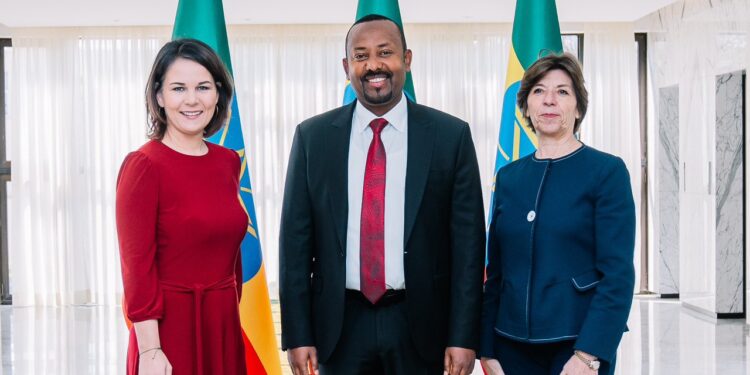Now that peace seems to be holding in Ethiopia’s Tigray region, attention is turning to the human rights situation and the violations that were reported during the two-year conflict.
The European Union has taken a stand on the matter, with France and Germany leading the call for accountability for the widespread abuses committed during the war.
The two countries’ foreign ministers who visited Ethiopia on January 12, 2023 made it clear that normalising relations with the EU is contingent on action being taken against the perpetrators of human rights violations.
German Foreign minister Annalena Baerbock, highlighted the crimes committed during the two-year war, including systematic sexualised violence.
“I would like to say, as a female foreign minister, no, it is not normal that rapes are part of wars,” Baerbock was quoted as saying by Africa News.
“Humanitarian international law is clear: Civilians and the protection of civilians is a top priority in armed conflict, and rapes are crimes of war.”
She was speaking at a relief food distribution centre just outside Addis Ababa. The site is run by the UN’s World Food Programme and is the holding centre for the war-torn regions of Ethiopia.
You Might Also Like: Ethiopia peace deal gets underway
The European Union halted all financial assistance to Ethiopia during the Tigray war citing humanitarian abuses. It urged stronger sanctions against the Ethiopian federal government, which retaliated by locking out the bloc from the process that led to the Pretoria peace accord that was eventually signed on November 2, 2022. The US was granted observer status.
The foreign ministers also hailed the success of implementing the Ethiopian peace agreement, which ended the two-year war. French Foreign Minister Catherine Colonna said the good progress should be encouraged to continue.
“Hostilities have ceased, aid has been able to reach the regions which had not received it… a return of arms (by rebels) has begun,” she said and called for the establishment of a transitional justice mechanism to punish the abuses.
A diplomatic source indicated that the European Union is ready to re-engage in Ethiopia provided the ceasefire agreement is respected and a transitional justice mechanism is put in place. Colonna said implementing the deal and following through on promises of accountability was the condition for Europe’s re-engagement.
“There is no peace that can be lasting without justice,” she said after meeting with Ethiopian Prime Minister Abiy Ahmed.
United Nations investigators have found evidence of killings and rapes during the conflict in northern Ethiopia, which also affected the regions of Afar and Amhara.
Troops from neighbouring Eritrea in particular stand accused of widespread sexual violence while fighting alongside the federal government in Tigray and remain in the region despite demands for their withdrawal.
It was not clear whether Ethiopia’s stated intention to act on the violations would appease the EU’s demands for accountability. The justice ministry has prepared a paper laying out a framework for investigating and prosecuting war criminals, although the government had previously tried to block funding for the UN’s committee of experts investigating allegations violations.
Foreign Minister Demeke Mekonnen told journalists during an interview that Ethiopia has asked the UN human rights office “to support the transitional justice policy consultation process” and deploy monitors in conflict-affected areas alongside the state-appointed human rights commission.
The war between the Tigray People’s Liberation Front and the Ethiopian government erupted in November 2020. It displaced over two million people, causing thousands of refugees to pour into neighbouring Sudan and rendering 2.3 million people in need of humanitarian aid.







